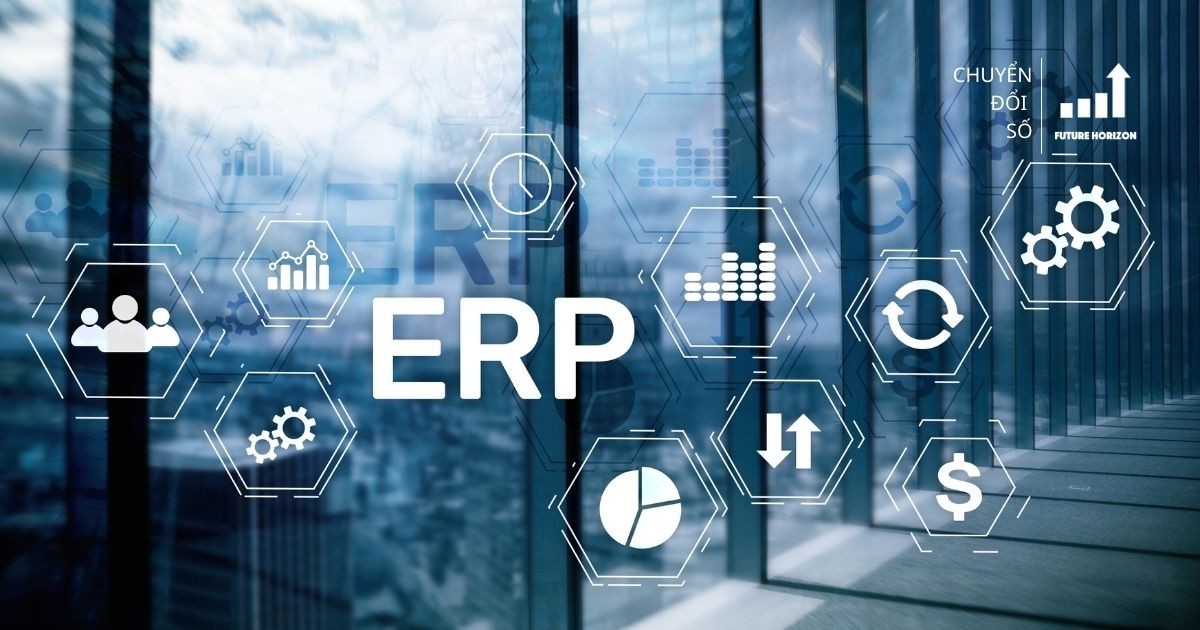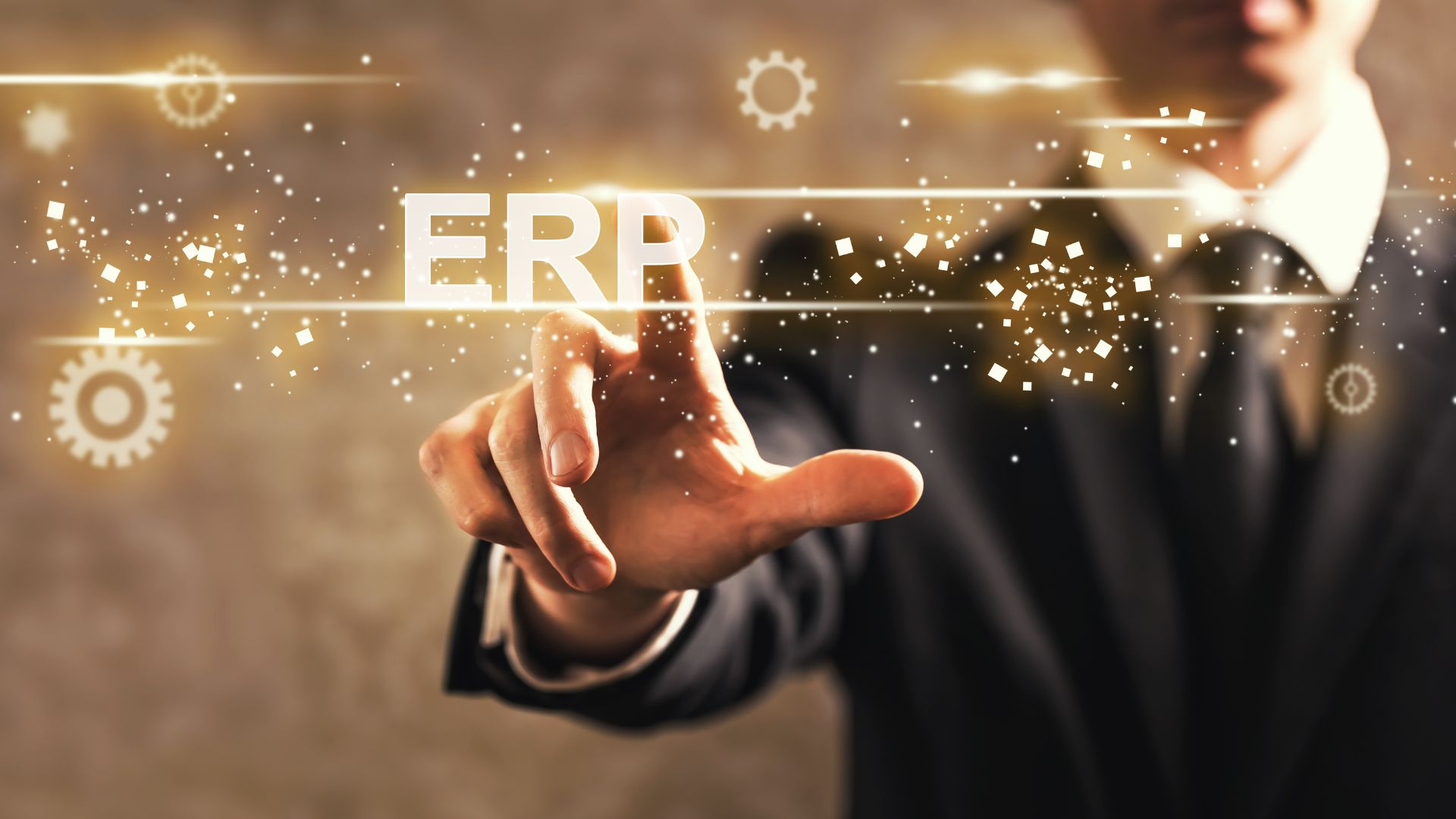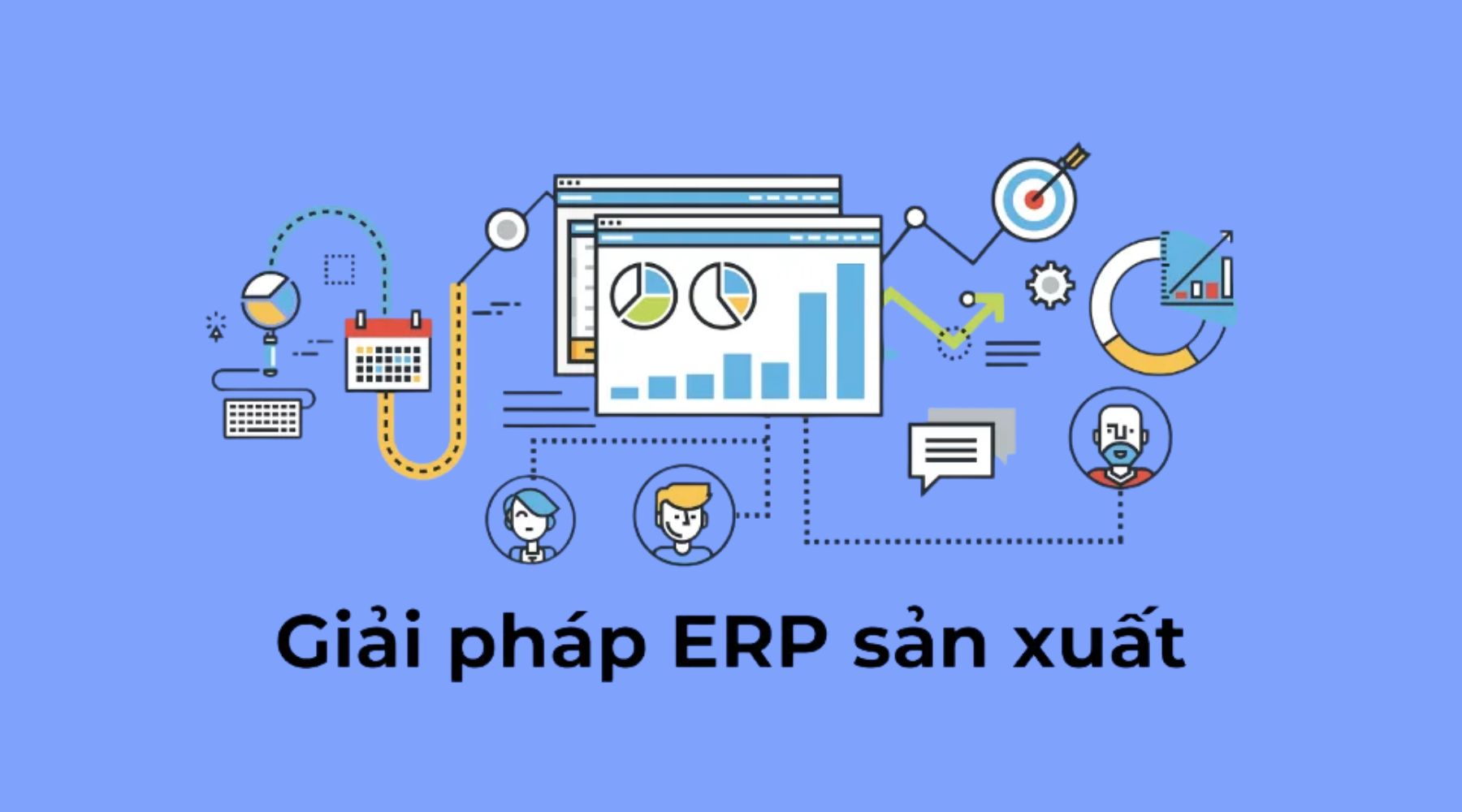In the context of increasingly fierce competition, manufacturing enterprises are forced to optimize processes, minimize costs and improve performance to survive and develop. The ERP system in manufacturing was born as a comprehensive solution, helping enterprises centrally manage all activities from raw materials, production, inventory to distribution. With the ability to deeply integrate and synchronize data in real time, ERP in manufacturing enterprises not only improves operations but also supports strategic decision making and sustainable expansion.
1. Overview of ERP System in Manufacturing
In a context of fierce competition, manufacturing enterprises need a system that helps optimize the entire chain of operations - from purchasing, production, sales to finance and human resources. ERP in manufacturing is the key solution to help businesses achieve efficiency, transparency and consistency.
1.1. What is ERP?
ERP (Enterprise Resource Planning) is an enterprise resource planning system that allows for the integration and comprehensive management of business activities on a unified platform. Especially with ERP in manufacturing enterprises, this software acts as a coordination center, helping businesses control every stage in the production line and related departments.
Basic features of ERP system in manufacturing:
The ERP system in manufacturing enterprises is not only a management software, but also a technology platform that helps the organization operate effectively, consistently and transparently. The following outstanding features are the reasons why more and more manufacturing enterprises choose to deploy ERP as a core strategy in digital transformation:
- High integration: ERP connects all departments such as production, finance, warehouse, purchasing… into a unified process, helping to minimize overlap and errors.
- Operate according to standardized procedures: Rules, plans and tasks are clearly established, supporting businesses to operate more consistently and professionally.
- Centralized database: Helps store and retrieve information easily, creating a foundation for analysis, forecasting and accurate decision making.
- Increased coordination: ERP helps departments collaborate more closely, responding faster to changes in production and the market.

Main subsystems of ERP in manufacturing enterprises:
ERP systems in manufacturing are made up of many specialized subsystems, each subsystem is responsible for a specific group of functions but still closely linked together in a continuous process. The synchronous integration of these subsystems helps businesses control all production and business activities effectively, minimize errors and optimize resources.
- Financial accounting: Automatically record and summarize production costs, effectively control budget.
- Production planning & management: Monitor progress, machine capacity, optimize production schedule.
- Purchasing Management: Ensure raw materials are available in the right quantity, at the right time and at the right price.
- Sales & Distribution Management: Synchronize orders – inventory – shipping to improve customer experience.
- Inventory management: Real-time inventory tracking, loss and backlog control.
- Human resource management: Support timekeeping, payroll, labor productivity management.
- Quality Management: Ensure products meet standards from the start, reducing the rate of defective goods.
- Project Management: Track the progress of large orders or specific manufacturing projects.
- Management report: Provide real-time analytical data to support managers in strategic decision making.
The implementation ERP system in manufacturing not only helps businesses streamline processes but also creates sustainable competitive advantages. With modern solutions like Bizzi, businesses can easily integrate ERP into the management ecosystem, ensuring flexibility, scalability and outstanding efficiency in operations.
1.2. Why do manufacturing businesses need specialized ERP?
An ERP system specifically designed for the manufacturing industry helps businesses overcome operational barriers, improve cost control, optimize processes and improve product quality.
Without ERP, manufacturing businesses can face a host of challenges:
In a complex and volatile manufacturing environment, the lack of an ERP system in manufacturing makes it easy for businesses to lose control of data, operate inefficiently, and struggle to compete. Here are some typical risks:
- Lack of accurate data for decision making leads to emotional and ineffective decisions.
- Inaccurate production planning due to having to handle too many SKUs, complex BOMs, and constantly changing orders.
- Fragmented data makes it difficult to control production costs and lacks transparency.
- Manual, overlapping processes reduce efficiency and increase processing time.
- Outdated, poorly integrated ERP systems hinder operations and expansion.
- Poor inventory management can easily lead to excess inventory or out of stock situations.
- Errors in data collection affect progress and quality.
- Employees are overloaded with repetitive tasks, which reduces productivity.
- Resources are used inefficiently.
- Incomplete or delayed financial and operational reporting affects the entire management system.
- Planning and scheduling are impractical due to lack of accurate inventory data.
- Supply chain disruptions, delayed deliveries, impact on reputation and revenue.
- Product quality is difficult to maintain at a stable level, affecting customer confidence.
Benefits of applying ERP in manufacturing enterprises:
Below are the outstanding benefits that ERP systems in manufacturing enterprises can bring:
- Optimizing production processes: Synchronized data and automated processes help reduce errors and effectively control risks.
- Accurate inventory management: Real-time tracking, avoid shortage or surplus of raw materials, save storage costs.
- Improve product quality: Integrate quality control (QC) into every step of the process.
- Improved forecasting capabilities: ERP provides analytical data on production trends and market demand to support accurate planning.
- Reduce operating costs: Reduce waste, optimize human resources and resources, eliminate overlapping work.
- Ensuring compliance and security: ERP supports tracking of quality control, financial and business data security metrics.
- Increase work efficiency: Automation frees employees to focus on higher-value tasks.
- Connecting departments: Every department – from manufacturing, warehouse, accounting to senior management – operates on a single data platform.
- Flexible adaptation: The system helps businesses respond promptly to market fluctuations or supply chain disruptions.
The main features of ERP in manufacturing include:
To operate effectively in a modern manufacturing environment, businesses need an ERP system in manufacturing that integrates a full range of specialized features, supporting comprehensive control from planning to execution. Below are the outstanding functions that a modern ERP system brings:
- Bill of materials (BOM) management.
- Material requirements planning (MRP).
- Master production scheduling (MPS).
- Manufacturing Demand Management (MDS) and Manufacturing Capacity Management (ACP).
- Work in progress (WIP) tracking, process management and production statistics.
- Calculate cost and automatically calculate production accounting.
- Quality management and traceability.
- Manage import and export, inventory, assets and equipment maintenance.
- Integration with machinery and production equipment systems.
- Supply chain and supplier management.
- Provide real-time production reports, support quick decision making.
- Comply with regulatory requirements and minimize operational risks.
2. ERP Implementation and Optimization in Manufacturing
ERP systems in manufacturing play a central role in digitizing processes, improving operational efficiency and controlling costs effectively. Proper implementation helps businesses maintain competitiveness, flexibility in management and increase adaptability to market fluctuations.
2.1. Factors to consider when choosing manufacturing ERP
Choosing an ERP system in manufacturing is not only a technical decision but also a long-term strategy that affects the entire business operations. To ensure effective implementation and optimization of resources, businesses need to carefully consider the following factors:
- Business size and needs: ERP systems in manufacturing are often suitable for medium and large-sized enterprises thanks to their deep integration capabilities and multi-dimensional control. For small enterprises, the cost of implementation and maintenance can be a burden if the needs are not clearly defined. Therefore, it is necessary to prioritize essential subsystems such as: production management, warehouse, purchasing, accounting and human resources, and must be consistent with the management orientation of business leaders.
- Field of operation and development orientation: Each manufacturing industry has its own characteristics in terms of processes, quality and raw materials. ERP in manufacturing enterprises needs to be designed to suit specific industries such as: food, pharmaceuticals, mechanics, plastics, construction materials or electronics. In addition, the system needs to be scalable and customizable to adapt to changes in strategy, scale or business model in the future.
- Budget and solution provider: An ERP system in manufacturing requires a significant investment, including: software purchase costs, implementation, training, maintenance and periodic upgrades. Businesses need to choose a supplier with experience in the manufacturing industry, transparency in costs and a clear customer support policy. Another important factor is implementation time - priority should be given to units with an optimal implementation process, systematic training support and long-term after-sales service.
2.2. Instructions for effective ERP production implementation
To deploy ERP in manufacturing To be effective, businesses need to plan carefully from goals to partner selection.
- Define goals and processes: Clarify business objectives when applying ERP system in manufacturing, evaluate current processes to identify weaknesses and determine areas for optimization.
- Process mapping: Analyze each step in the production chain to understand how ERP in manufacturing enterprises can improve productivity, reduce losses and improve management efficiency.
- Form a project team and select partners: Build an implementation team of department heads with knowledge of data and systems. At the same time, cooperate with an experienced ERP consultant to support implementation, training and transfer.
- Identify risks and how to limit them:
- High cost, long implementation.
- Unstandardized processes can easily cause system-wide errors.
- Difficult to upgrade after deployment.
→ Businesses can combine ERP with specialized software to reduce risk and increase flexibility.

2.3. Optimize financial management with ERP add-on solution
In the ERP system in manufacturing, the financial subsystem plays an important role in helping businesses control costs, track cash flow and comply with accounting and tax regulations. However, to achieve a higher level of efficiency in financial management, many manufacturing enterprises have proactively integrated specialized solutions to automate processes and increase operational efficiency.
The Role of Financial Automation in the ERP Ecosystem
While ERP systems in manufacturing businesses often include a basic financial module, advanced financial automation tools can:
- Speed up accounting and financial processing without manual intervention
- Reduce errors, increase transparency and data traceability
- Improve spending monitoring efficiency, support strategic financial decision making
- Optimize personnel costs and document processing time
Dedicated financial automation solutions should integrate
To maximize the effectiveness of ERP systems in manufacturing, businesses should incorporate specialized financial automation solutions. These tools not only speed up business processing but also enhance cost control, legal compliance and improve cash flow.
- Automatically process and manage input invoices: Apply RPA and AI technology to download, check and compare invoices with POs and warehouse receipts in real time. The system also supports supplier tax code verification, discrepancy detection, storing valid invoices for 10 years and synchronizing data with ERP via API.
- Expense management and business expenses effective: Set budgets by department or project, automatically monitor and alert when limits are exceeded. Streamline spending approval processes, real-time reporting and comprehensive expense control from booking, expense tracking to expense approval.
- Electronic bill and debt management: Create and issue XML/PDF standard electronic invoices, store according to legal regulations. Automatically remind debt via email or text message, track payment status, warn of debt due and support debt reconciliation.
- Financial integration and access to capital: Directly linked to banks, supply chain finance platforms and working capital sources. Flexible, easy-to-configure solution, compatible with purchasing-accounting processes in ERP systems in manufacturing.
3. Integrate ERP system in manufacturing with Bizzi's financial automation solution
ERP in manufacturing helps businesses synchronize operating processes and effectively control all resources. However, to maximize the value of the ERP system, especially in the field of finance and accounting, many businesses have chosen to integrate additional specialized platforms such as Bizzi to optimize financial management processes.
Bizzi is the leading financial automation and electronic invoice processing platform in Vietnam, trusted by many large enterprises such as Imexpharm, La Vie, Guardian Vietnam
- Automate input invoice processing: Identify, check and compare invoices with orders, warehouse receipts... before pushing data into the ERP system.
- Debt reconciliation, expense management: Update debt status, business expenses, budget limits on a platform synchronized with current ERP.
- Synchronize data via API with popular ERP systems: SAP, Oracle NetSuite, Microsoft Dynamics 365, Odoo, Diginet, and accounting software such as MISA, Fast, Bravo…
- Support businesses to optimize internal financial processes: Automatically circulate invoices, reduce approval time, and limit manual errors.
Successfully implemented real projects show that when ERP is combined with Bizzi Automation Solutions, businesses not only manage processes well but also standardize financial systems, minimize risks and increase operational scalability.
Bizzi currently provides solutions that integrate directly with ERP systems, suitable for manufacturing businesses looking for a platform that provides in-depth support for financial operations without changing the existing ERP structure.
Learn more about Bizzi and ERP integration solutions at https://bizzi.vn/tich-hop-erp/ or sign up for a consultation to receive a free demo.
4. Conclusion and Recommendations
ERP in manufacturing is a comprehensive solution that helps businesses effectively control the entire chain of operations from raw materials, production, inventory to distribution. By integrating processes on a unified platform, the ERP system in manufacturing not only minimizes errors, increases processing speed but also enhances decision-making ability thanks to accurate data in real time. In particular, ERP in manufacturing enterprises Modernity also allows for customization according to industry specifics, helping businesses maintain flexibility in a highly competitive environment.
To optimize investment efficiency, manufacturing enterprises should consider the following recommendations:
- Carefully assess industry needs and characteristics: Before implementation, businesses need to clearly identify which processes need to be optimized, current bottlenecks and long-term goals to choose the most suitable ERP module.
- Prioritize integrating specialized solutions if there is already an ERP platform.: For businesses that have applied ERP but want to increase efficiency in the finance and accounting sector, combining specialized automation solutions will help save time and minimize manual errors.
- Choose the right system for your business expansion level: With the need to expand into supply chain management, multi-channel sales or customer care, integrating modules such as CRM, SCM into the ERP system is necessary to increase the ability to synchronize and control comprehensive data.
- Testing and evaluation before large-scale deployment: Businesses should use a demo or pilot implementation of a specific process to test the compatibility and actual performance of the ERP system with the existing software infrastructure.
Correct selection and implementation ERP system in manufacturing will create a solid foundation for sustainable business growth, cost optimization and overall efficiency improvement.


